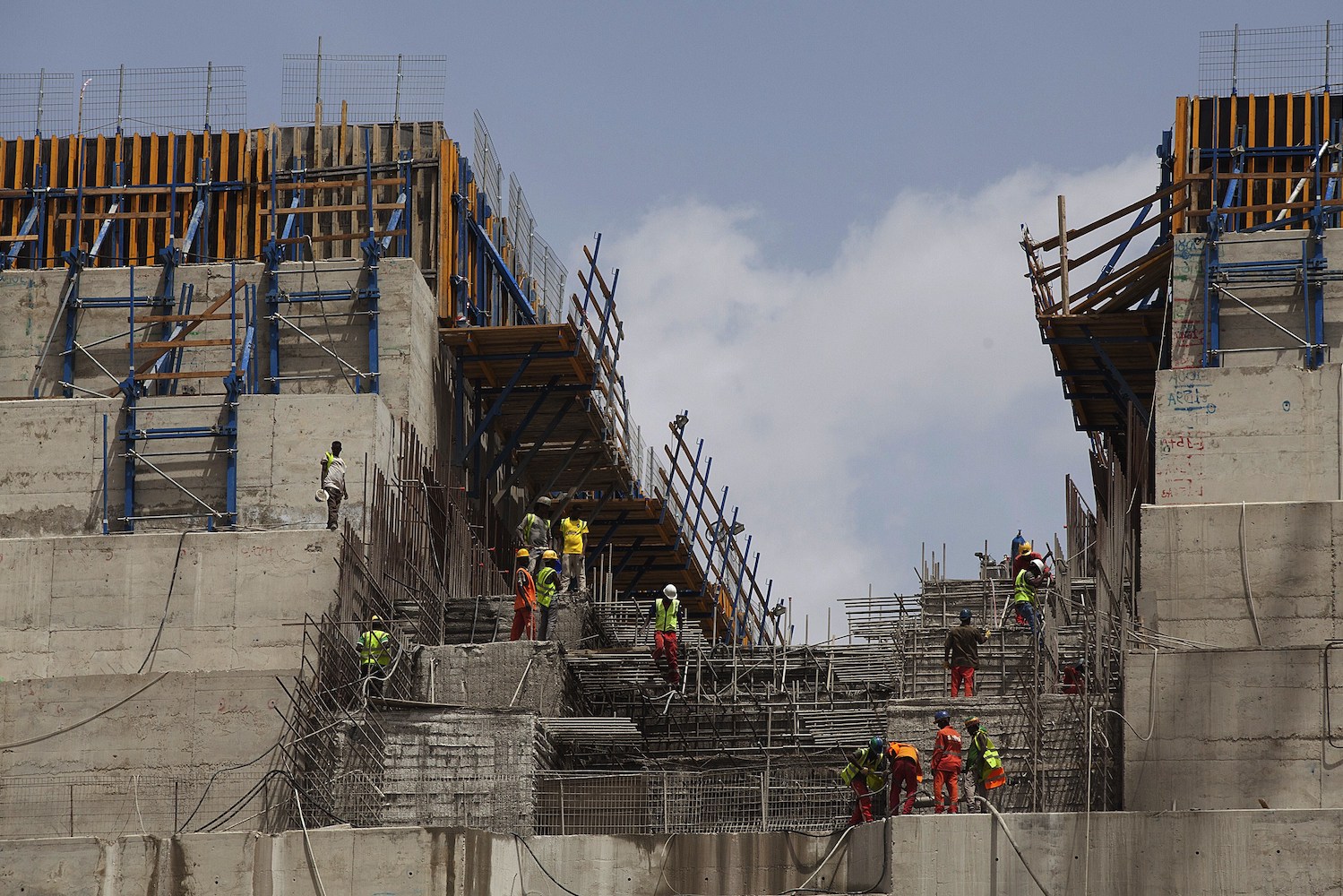
It may sometimes look puzzling why most of the riparian states of the Nile are keeping silent while only three contenders namely Sudan, Egypt and Ethiopia were engaged in uninterrupted disputes as to how to share the Nile waters between them. The other countries also have their shares of the Nile waters as lower or upper riparian states. Unfortunately however, there is no forum or framework within which these countries could express their views on the disputes as well as articulate their particular interests in order to avoid possible future clashes.
According to Dr. Yacob Arsano, who is an academic expert on Nile geopolitics and a leading advocate of Ethiopia’s legitimate right to develop its water resources, in his book entitled, “Ethiopia and the Nile Dilemmas of National and Regional Hydro-politics” that the Nile riparian countries were long divested of any idea of using the Nile waters for economic development due to the colonial powers that were occupying them and followed arbitrary policies that promoted their expansionist ambitions in the region.
While most riparian countries of the Nile have shaken off their colonial legacies, Egypt, it seems, is still a victim of it, as it sticks to colonial time thinking to promote its selfish, narrow and irresponsible quest for monopoly utilization of the Nile waters. As we have seen, Egypt too is a prisoner of this colonial legacy as it is seeking to maintain the colonial status quo as far as the Nile is concerned. Luckily, the Nile riparian countries do not seem to share Egypt’s avaricious attitude, although they so far displayed a high degree of patience and took time to express their views.
The lucky break came last week, when Kenya expressed its support to Ethiopia’s legitimate right to use its natural resources, including the Nile waters, to achieve economic development within its boundaries and in the region as a whole. For almost the last ten years, the dispute over the waters of the Nile has been raging between Egypt, Sudan and Ethiopia while all the other riparian states of the Nile were largely alienated from the discussions, watched the process unfold from a good distance or chose to keep silent on the future of the river in general as well as the Great Ethiopia Renaissance Dam (GERD) in particular. The discussions were not only monopolized by the three disputing parties while the other riparian countries were not given the chance to articulate their specific interests.
Kenya’s latest statement according to the Ethiopian embassy in Nairobi, can therefore be taken as a first time reaction that recognizes Ethiopia’s inalienable right to use its natural resources to develop its economy. This is in fact the crux of the matter and the gist of the dispute which was triggered when Egypt refused to recognize this right and clung to colonial time treaty to justify its almost monopolistic claims on.
The tripartite negotiations were so far stuck in an impasse simply because of Egypt’s refusal to recognize this right. Had Egypt recognized this right since day one, the talks could have taken giant steps forward and by now the matter could have been settled without dilly-dallying as to how this right could be exercised.
Hence, the basic weakness of Egyptian diplomacy is its refusal to put this right as a precondition and the central concern of the talks. Obviously, Egypt’s dependence on the Nile waters does not entitle it to have monopolistic claims since the river belong to all riparian rights and should be managed in such a way that the rights of all countries are taken into consideration.
On the other hand, the strength Ethiopia’s diplomacy resides in the fact that it did not deny Egypt’s right on the waters of the Nile but put it in perspective by accepting its share of the water and putting the risks and opportunities within acceptable limits. In fact Ethiopia clearly recognizes the rights of other riparian states, including Sudan, to a fair share of the waters of the Nile.
Ethiopian diplomacy is strong simply because it recognizes what should be recognized within the framework of the norms and practices of international law. Ethiopian diplomacy is also guided by the spirit of African Unity that encourages cooperation rather than conflict in its bid to develop the African continent as a whole.
This is also a sign how times have changed from the colonial times while Egyptian diplomacy on the Nile has not changed much from the colonial times demonstrated by its intransigent position on its share of the Nile waters that is still a major hurdle against reaching a comprehensive and all inclusive treaty for the development of the great Nile valley in general. Meanwhile Egyptian diplomacy is continuing to veer in all directions because has lost its trajectory and as if it chose to keep the dispute alive and longer by crating all kinds of pretexts in order to prevent the start of the filling of the GERD. Egypt knows too well that
once started, the filling will continue uninterrupted and all its attempts to torpedo it will fail and that would represent a failure of Egyptian diplomacy.
After trying all available avenues and opportunities to try to prevent the dam filling process, Egypt has now once again appealed to the United Nations Security Council (UNSC) to mediate between the two countries before the dam filling starts sometime in June this year. Here too, the objective of Egypt’s appeal is the filling of the dam and not some other aspect of the dispute. This clearly shows that Egypt is determined to prevent the filling of the GERD by any means because doing that would prevent the other aspects of the GERD project to proceed as scheduled. The Egyptian thinking seems to focus on ensuring that the filling of the dam does not take place this rainy season so that it will not take place during the following dry season and this is an effective way of interrupting works on the project as a whole. Clever, isn’t it?
Some people may ask why Egypt repeatedly appealed to the UNSC instead submitting its letter of appeal to the African Union headquarters in Addis Ababa. There may be two answers to this question.
First, Egypt is going to the UNSC in order to give the matter utmost importance and bring its baseless accusations to the attention of the international community. It has been conducting long campaigns of false accusations and blackmail by portraying Ethiopia as the perpetrator of some imagined injustice while Egypt is its victims. Second, Egypt might be too proud of its Arab identity to take the AU as a reliable venue for appealing against its perceived injustice, suspecting that its judgments might be favorable to Ethiopia which is closer to the continental organization as a sub-Saharan entity. This would however be the product of a perverse thinking because the AU is Africa’s sole organization that represents all countries equally irrespective of their historical, religious or political identities.
The third reason might be Egypt’s possible expectation of U.S. cooperation and support at the UNSC with its cause as it has already demonstrated it during the Washington talks late last year. By appealing to the UNSC, Egypt has lifted a simple technical dispute to a national security issue and that is definitely a wrong step that reveals Egypt’s hidden intention to impose its will be any means, including the use of military force.
Anyway, you look at it, there is nothing new in Egypt’s appeal to the UNSC as it has already done it and received a cool reception. This is so because international public opinion is clearly in favor of Ethiopia’s quest for development as it has always been the victim of poverty, drought and famines in the past. Instead of going to the UN, Egypt could go to the AU and make its case heard as an African country dealing with its African counterpart in the framework of the Charter, laws and treaties both countries are signatories to.
The AU has all that it takes to mediate between Egypt and Ethiopia as two founding members of the organization. It has also practical experience in dealing with disputes arising between member countries. To underestimate or ignore the AU’s ability to serve as mediator would be an insult to the memories of the great leaders of Africa, including Egypt Gamal Abdel Nasser and others. Egypt could appeal to the AU first and if that failed it could call for UN’s intervention.
Kenya’s reaction to the GERD project and Ethiopia’s right to develop its natural resources without asking for permission from third parties is a timely move that will be followed by other AU member states, not only by members of the Nile riparian countries but also by all members of the continental organization. Sudan has already criticized Egypt for appealing to the UNSC while the tripartite talks are under way. Sooner or later, Egypt will be forced to reconsider its intransigent hostility to the filling of the GERD and arrive at a rational, fair and legitimate decision that will also be a victory to the region, to Africa and to the international community.
The Ethiopian Herald June 28, 2020
BY MULUGETAS GUDETA



